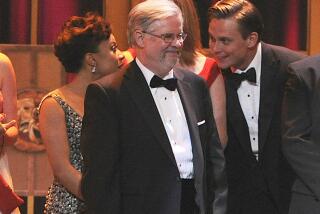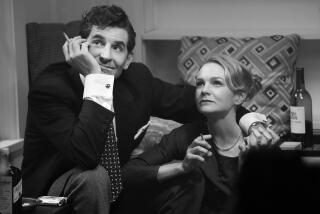PASSINGS: Phillip Hayes Dean, Cheo Feliciano, Hal Cooper
- Share via
Phillip Hayes Dean
Actor, director wrote one-man play ‘Paul Robeson’
Phillip Hayes Dean, 83, a playwright, director and actor who wrote the one-man play “Paul Robeson” starring James Earl Jones on Broadway in 1978, died Monday in Los Angeles from a heart condition, according to a family spokesman.
His plays include “The Last American Dixieland Band,” “Moloch Blues,” “Freeman,” “The Owl Killer and Dink’s Blues” and “The Sty of the Blind Pig,” which Time magazine called one of the best plays of 1971.
Dean’s most famous work is “Paul Robeson,” a chronicle of the singer, actor and civil rights activist, which has had three Broadway productions and a London production, and has toured across the United States and Europe. The two revivals on Broadway — in 1988 and 1995 — starred Avery Brooks. An Ebony Repertory Theatre production of “Paul Robeson” is playing at the Nate Holden Performing Arts Center in Los Angeles.
Born in Chicago and raised there and in Pontiac, Mich., Dean began his theater career at the Will-O-Way Playhouse in Bloomfield Hills, Mich. He later appeared on Broadway in “Wisteria Trees” starring Helen Hayes in 1955, and was a stage manager for an all-black version of “Waiting for Godot” in 1957. Dean also taught acting and playwriting at the University of Michigan.
Cheo Feliciano
Acclaimed salsa singer, member of Fania All Stars
Cheo Feliciano, 78, one of the world’s most recognized salsa singers and a member of the Fania All Stars, died in a car accident early Thursday in a suburb of San Juan, Puerto Rico.
Police said Feliciano was alone in his Jaguar when he hit a light post before dawn Thursday. He was not wearing his seat belt and it was unclear what led to the crash, according to officials, who said they did not find any drugs or alcohol in the car. Feliciano had recently been treated for cancer and pneumonia.
Feliciano, whose hits included “Una en un millón,” “Mi promesa” and “Contigo aprendi,” had established his own production company in the 1980s.
He was born in the southern coastal city of Ponce and as a child began playing instruments made from cans and other discarded items. His father struggled to find work as a carpenter, and the family moved to New York when Feliciano was a teenager.
Shortly after arriving, Feliciano joined a local band as a percussionist and became friends with music giants, including Tito Puente.
On Oct. 5, 1957, Feliciano married Socorro “Coco” Prieto, a Puerto Rican dancer, and that night, gave his first concert as a singer with the Joe Cuba band.
A decade later, he left the band and then collaborated with Eddie Palmieri on his album “Champagne,” but succumbed to heroin addiction shortly afterward and withdrew from the spotlight for nearly three years. He returned to his native Puerto Rico for rehab and became a prominent anti-drug spokesman.
He joined the Fania All Stars in 1972 and that year released “Cheo,” a solo album that is considered one of his best.
Hal Cooper
Director of TV’s ‘Maude,’ ‘Dick Van Dyke Show’
Hal Cooper, 91, who directed hundreds of episodes of TV comedies such as “Maude,” “The Dick Van Dyke Show” and “The Brady Bunch,” died April 11 at his home in Beverly Hills. The cause was heart failure said his son, James.
Cooper’s first opportunity to direct came in the 1930s when he was part of the acting troupe on the children’s radio show “Rainbow House.” When in traditional show business fashion the director of the live program became ill, Cooper, though only 13, was pressed into service because he already knew how to run a show.
“I spent all my time when I was not acting in the control room, learning all about it,” Cooper said in a 2003 interview recorded by the Academy of Television Arts and Sciences.
Born Harold Cooper on Feb. 23, 1923, in the Bronx, he spent his childhood mostly on Long Island. After a stint in the Navy Reserve and studying theater at the University of Michigan, he got a job producing and writing “Your Television Baby Sitter,” a 1947 show on the Dumont TV network that aimed to entertain children while parents did chores.
Moving to Los Angeles in 1958, he worked on a soap opera and then broke into network television sitcoms in 1962, when he directed two episodes of “The Dick Van Dyke Show.”
Cooper was prolific — he directed 126 episodes of “Maude” starring Bea Arthur in the 1970s and 81 episodes of “Gimme a Break!” starring Nell Carter in the 1980s. He worked into the late 1990s.
In a 2003 interview for the Directors Guild of America, Cooper said one of his favorite shows that he directed was a 1975 episode of “Maude” in which Arthur had a session with a psychiatrist. The episode was essentially a monologue and Cooper wanted nothing to detract from her.
“In the entire half-hour show, I had 11 camera cuts, in a half-hour comedy where usually there are hundreds,” Cooper said in the interview. “It was a brilliant performance.”
Times staff and wire reports
More to Read
Start your day right
Sign up for Essential California for the L.A. Times biggest news, features and recommendations in your inbox six days a week.
You may occasionally receive promotional content from the Los Angeles Times.






